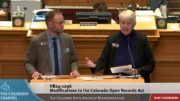By Jeffrey A. Roberts
CFOIC Executive Director
An audit released Thursday finds fault with the city of Denver’s process for complying with open records requests, calling it “not as accessible or transparent as other Colorado governments.”
City Auditor Tim O’Brien recommended several improvements, most of which the mayor’s office has agreed to adopt.
He found that Denver does not provide “sufficient” guidance on its website for requesting city records under the Colorado Open Records Act (CORA). The city also does not know how many open records requests it gets, how much time is spent processing them or how much it charges in fees for researching and compiling requested records.

Other problems identified by the audit: Fees and fee waivers are not consistent across city agencies; the city does not consistently notify requesters when filling their requests takes longer than allowed by CORA; the city doesn’t always fully address open records requests; and agencies don’t retain enough supporting documentation of requests.
“Transparency touches every other part of the city’s agenda, whether it’s homelessness, parks, or the COVID-19 response,” O’Brien said in a news release. “The city should be able to — and should make it a priority to — fairly and clearly answer the public’s questions about these and other important issues according to the law.”
O’Brien’s office compared CORA information on Denver’s website to open-records pages on the websites of Aurora, Colorado Springs, Fort Collins and the counties of Arapahoe, El Paso, Jefferson and Larimer. The other governments “provide more information that better informs requesters on how to submit an open records request,” the audit says.
Denver’s CORA webpage is hard to find from the city’s homepage and lacks a clear explanation of CORA and how it works, the auditor’s office wrote. The auditor also found that many records requests were initially sent to the wrong city agency and had to be rerouted.
“Because of frustration created by rerouted requests, some members of the public may abandon open records requests and not obtain access to the information they seek,” the audit says. “Continued issues with records request responses could result in reputational damage to the city or individual agencies. This could create the perception among the public the city is not being transparent or open, which is in direct contrast with the stated goal of the Colorado Open Records Act.”
City agencies track CORA requests inconsistently, the auditor noted, leaving the city unable to measure their impact and assess how the system might be made more effective and efficient. Some Denver agencies track the fees they charge but others do not. “No agency specifically tracks how much time it spends fulfilling open records requests.”
The city of Seattle, in contrast, collects “valuable data on which to base decisions and identify areas of weakness.” In 2018, according to the audit, Seattle processed 14,352 public records requests and spent an estimated 119,494 staff hours fulfilling those requests at a cost to the city of about $7.5 million.
The Denver auditor praised Larimer County for publishing an online database that lets the public see how many requests are made, the types of requests and what documents are provided. “By doing this, members of the public can proactively retrieve data from previous requests and learn from the requests of others.”
CORA allows governments and agencies in Colorado to charge up to $33.58 an hour, after the first hour, to research and retrieve public records in response to requests. Denver agencies are inconsistent in the way they charge for records, the audit found, with one charging the same fee for a duplicate request (one that already had been fulfilled in the past year) and others charging no fee for such requests because the documents are readily available.
Some Denver departments never grant fee waivers, the audit says, while others grant them on a case-by-case basis. In 2018, it notes, one agency charged $35 an hour for a records request, more than the law allows.
The Denver auditor used a “secret shopper” technique, submitting open records requests using aliases to “get a firsthand view of how agencies handle requests from the public.” Of 14 requests, four responses came after CORA’s specified deadline of three working days. One took eight days, another 12 and the agency did not invoke CORA’s “extenuating circumstances” provision in writing, as the law requires.
The auditor also found instances where city agencies did not fully address open records requests. An example: The audit team asked the Denver City Council for a former employee’s email correspondence and work history records. “After back-and-forth communication with the records custodian to refine the request, the agency provided the email correspondence but not the work history of the employee.”
The office of Mayor Michael Hancock agreed to implement nine of the auditor’s 14 recommendations for fixing the identified problems. It balked at conducting a cost-benefit analysis for creating a standardized process for receiving CORA requests, calling it “unnecessary,” and disagreed with the auditor’s suggestion that it compile city agencies’ CORA request data and report it annually to the public.
“This should remain with the individual departments to track, maintain and report as necessary,” Hancock’s office wrote.
In his news release, O’Brien said he is “particularly disappointed” in Hancock’s refusal to compile and report citywide information about CORA requests. “Our audit team believes compiling citywide information should not be too burdensome and would contribute to efficiency in open records responses as well as improve overall transparency.”
Follow the Colorado Freedom of Information Coalition on Twitter @CoFOIC. Like CFOIC’s Facebook page. Do you appreciate the information and resources provided by CFOIC? Please consider making a tax-deductible donation.




